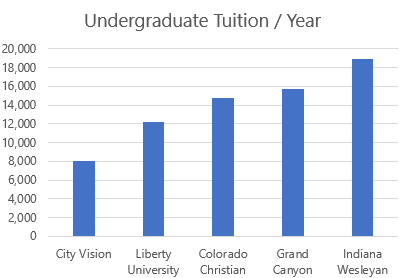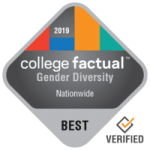Tuition
$8,000 total ($800/course)
Next Start Date
June 9, 2025
Class Type
100% Online, 8 Week Courses
Transfer Credits
Up to 25% of credits can be transferred or come from prior learning assessment
Required Core Courses | Culminating Experience (pick 1) |
Students must select one concentration. Students may also select a Diversified Concentration where they can choose any combination of concentration courses to create their own custom concentration where they may also take one undergraduate 300 or 400 level courses in the course schedule. For help developing a degree plan you can watch the video How to Determine What Courses You Need to Graduate and follow the instructions in our Degree Completion Plan Template.
| Ministry Management Concentration (Pick 3)
|
Counseling Ministry Concentration (Pick 3)
|
Cross-Cultural Urban Ministry Concentration (Pick 3)
|
Ministry & Interpersonal Competencies Operations & Governance Competencies | Innovation & Entrepreneurial Competencies Business & Funding Competencies |
Each of our courses map the above competency domains that relate to the Management Skills Assessment Instrument/Competing Values Framework. Students can use this framework to develop custom competency maps for their degree plan based on their goals. Relative to our other degrees, this degree emphasizes the Ministry & Interpersonal Competencies more.
Degree outcomes are the overall skills and knowledge we expect you will have after successfully completing a degree program at City Vision University. After completing the degree, you will be able to do the following:
You must submit the following:
For more information read our admissions instructions and standards of admission.
To graduate, students must:
Undergraduate Certificates (6 courses, 8 months): Addiction Counseling, Nonprofit Management, Business, Ministry, Nonprofit Fundraising, Food Service Management & Retail Management.
Graduate Certificates (4 courses, 5 months): Addiction Counseling, Nonprofit Management, Ministry, Nonprofit Fundraising.
We are accredited by the Distance Education Accrediting Commission, which is listed by the U.S. Department of Education as a recognized accrediting agency.
We are an Approved Provider for NAADAC, which allows us to provide an educational path to addiction counseling certification in most states.
With our 8-week format and 5 start dates per year, you can study on your schedule in 100% online courses. You never have to travel to a physical campus.
Our online courses are like live courses but instead of live lectures, most are recorded. Instead of live discussion, you have discussion forums with other students.










Like us, you work to transform lives. But some people you serve may appear stuck in dysfunction. You may feel over your head, like no one trained you for this. The needs seem endless, and you want to be more effective.
You know you need training to serve well, but you don’t have the time to stop working to get trained. City Vision’s flexible online programs allow you to balance work, family, and the rest of your life.
You deserve an affordable, flexible degree so you can help move your nonprofit to profound success. We want our students to know they are making a difference.
You may feel like your current position is an accident. But there are no accidents in God’s plan. Study with City Vision, clarify your calling, and be equipped to transform more lives than you’ve imagined.
To get credit for experience, first take City Vision’s Prior Learning Assessment Portfolio Development course, which uses the CAEL portfolio process. In this course you will develop a portfolio of your learning experience using a template we provide. For each subject area where you believe you should receive credit, you must identify a course at an accredited institution where you believe that you have already mastered the learning outcomes for that course. For each course that you want to receive credit for, you need to develop a specific portfolio section where you provide several pages of documentation on how you have achieved the learning outcomes of the course. A faculty member then reviews your portfolio to assess whether you have provided adequate documentation to be granted credit.
After completing this eight-week course, you will get 3 elective credits toward your degree plus the credits for any courses where you documented that you met the course outcomes through your portfolio. You have up to 3 months to submit the rest of your portfolio to get credit for additional courses where you can document learning. After the three months, you can pay $100 to have additional sections of your portfolio reviewed. Undergraduate students can receive credit for up to 25% of their degree through prior learning (30 credits for a bachelor’s or 15 credits for an associate’s) and graduate students can receive credit for up to 25% of their degree (9 credits for an MBA).
We have credit recognition partnerships with Wheeler Mission, The Urban Ministry Institute (TUMI), Third Millennium, Saylor Academy, Vision International, Harvestime Institute, Genesis Process and YWAM’s University of the Nations. If you are with an organization that would like to set up a Credit Recognition Partnership, please contact us.
For the 2024-25 year, we offer the following tuition scholarships:
Here are the steps to request a scholarship:
City Vision offers two types of partnerships with organizations.
Multi-Student Organizational Discounts. We offer a scholarship to students from any organization that refers multiple students to City Vision in a given year. The scholarship makes tuition $5,500 ($550/course) for both undergraduate and graduate programs. If an organization does not have more than one student for at least a year, that organization loses its scholarship status. If you are with an organization that would like to receive this discount, please contact us.
Credit Mapping Partnerships. City Vision sets up credit mapping articulation agreements with ministries that have high-quality ministry training that can be evaluated through our prior learning assessment process. We have credit mapping partnerships with Wheeler Mission, The Urban Ministry Institute (TUMI), Third Millennium, Saylor Academy and YWAM’s University of the Nations, among others, that work in conjunction with our prior learning process. If you are with an organization that would like to set up a Credit Mapping Partnership, please contact us.
Yes. City Vision has worked with many employers that offer tuition assistance or reimbursement.
For students whose employer will pay their full tuition, we can work with you to send your tuition invoice to your employer for them to pay directly.
For students that pay their own tuition and need reimbursement with their employer, we provide the invoices and documentation you need to get reimbursed.
City Vision believes we are among the best in the world in providing an extremely practical Christian education for those interested in Addiction Counseling and Nonprofit Management.
While state schools can provide information about counseling, City Vision will provide very practical counseling education with deep Christian integration. Similarly many state schools’ nonprofit management programs are often essentially generic business degrees, while we help our students integrate their Christian values in how they run nonprofit organizations and businesses.
Many community colleges or state schools will advertise “free” or nearly free tuition. Historically, for City Vision students that have applied for a Pell grant, 79% have qualified. For students that receive a full Pell grant, the grant will pay all your tuition making the cost to the student only the cost of books (which is similar to many community colleges or state schools).
City Vision is very focused on providing extremely practical Christian education for those interested in Addiction Counseling and Nonprofit Management. City Vision offers fewer degrees than the mega-universities, but the degrees that we do, we do very well. We like to think of ourselves similar to the family-run hardware store where staff can answer all your questions with personalized service as opposed to the big box department stores like Walmart that offer everything.
Liberty and Grand Canyon are fine schools if they are what you are looking for, but we believe we are superior for students seeking an affordable, practical education in what we teach. The following shows how we believe our strengths compare to those of Liberty and Grand Canyon:
City Vision | Liberty/Grand Canyon | |
Cost/Tuition | $8,000 per year | $12,198/$15,725 per year |
Core Competencies | Nonprofit Management & Addiction Counseling degrees, with personalized service and practical training | Hundreds of degrees, convenience that comes from scale of 100,000+ students |
History/Culture | 20+ year history of serving the poor, addicted and underserved, including partnerships with rescue missions and Salvation Army | Liberty was founded by Jerry Falwell. Grand Canyon was a for-profit school. |
Speed to Degree | Extremely flexible acceptance of transfer credit and prior learning credit | Somewhat flexible transfer credit. |
Student Recruitment | Primarily word of mouth and partnerships with 90+ rescue missions, Salvation Army, counseling centers, 500+ nonprofits and urban ministries | $100 million+ advertising campaigns |
We have never had a student who wasn’t accepted into a graduate program based on our degrees, although in some cases with state schools we have had to advocate for them.
Our alumni have been accepted into the following schools: Grand Canyon University, Bay Path University, Southwest Baptist Seminary, Fuller Seminary, California University of Pennsylvania, James Madison University, Liberty University, North Park University, Southern New Hampshire University, St Mary’s University of Twickenham, Trinity Bible College, Bakke Graduate School and AG Theological Seminary.
Ultimately the acceptance of any degree or transfer credit is up to the receiving institution.
City Vision is nationally accredited by the Distance Education Accrediting Commission (DEAC), which is recognized by the US Department of Education and CHEA. The US Department of Education does not recognize a distinction between regional and national accreditation in its standards and recently stated, “The Department does not believe…that rejecting transfer credits, an application for admission to graduate school, or a request to sit for a State occupational licensing exam on the basis of the type of Department recognized accreditation is justified.” See the US Department of Education letter on National vs. Regional Accreditation.
We have heard from a number of our students that other schools (sadly, even Christian schools) use scare tactics as a part of their sales practice, and misrepresent the significance of the distinction between national and regional accreditation.
From a Christian social justice perspective, many have called the distinction between regional and national accreditation a cartel that is a major injustice that hurts the poor. Having said that, there are those that still maintain this distinction, so we address their concerns in this section. This letter from Dr. Leah Matthews addresses some concerns about the quality of DEAC accreditation.
Functionally, our experience has been that the distinction between regional and national accreditation is primarily of importance for:
Ultimately, choosing City Vision’s national accreditation over a regionally accredited school is a question of value: you get more for your money with City Vision. If you need the “gold plating” of regional accreditation for one of the reasons described above, then it may be worth paying 2-10 times more to get a degree with regional accreditation from another school. However, because of the career choices of our students, they prefer to choose the value of City Vision rather than more expensive high-end options.
Historically, 70-80% of our alumni work in the nonprofit or ministry sector after graduation.
The others work in business with strong values that reflect strong social responsibility, Christian values and entrepreneurship.
We have had hundreds of students that have come from over 90 Gospel rescue missions.